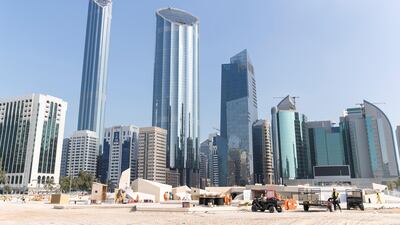Abu Dhabi enacted a new law on Thursday designed to encourage private sector involvement in housing, infrastructure and education projects in the capital, as part of the three-year Dh50 billion "Ghadan 21" programme to boost the economy.
The law formalises the creation of a government body set up last year to drive foreign direct investment – the Abu Dhabi Investment Office – and gives it an extra mandate – to lead the UAE's first public-private partnership programme.
From this year, the office will work with government departments to identify key projects that will benefit from a PPP model to bring them to fruition.
It intends to launch "at least three" significant PPP schemes for tender to the private sector by this summer, Elham Alqasim, acting chief executive of Adio, told The National.
“The office will act as a permanent interface for the private sector to interact with government for all of its needs and throughout the PPP tender process,” she said.
She declined to reveal further details about what the first projects will be, but said they fall within the categories of housing, infrastructure, transport and education.
The exact value of the projects is to be determined during the commercial bidding processes, but they likely amount to billions of dirhams of investment. “We have a very healthy pipeline,” Ms Alqasim said.
The law enacted on Thursday sets out a general framework for the practice of PPPs, but the terms of each deal – for instance, whether there will be payment guarantees from the government to reduce financial risk to investors and incentivise their involvement – would be worked out on a case-by-case basis.
The business models that materialise are expected to range from build-only schemes, to build, operate and maintain agreements whereby the private sector takes a long-term stake in the scheme. Adio is targeting both local and international businesses.
“We are looking at examples of similar transactions around the world – proven models of successful PPP schemes that have provided higher-quality outcomes for citizens than they may have otherwise,” Ms Alqasim said.
The oil-rich Arabian Gulf states are eyeing new ways of growing their private sectors to reduce dependency on hydrocarbons revenues, create sustainable routes to employment and provide more efficient services to citizens.
In Abu Dhabi, the PPP programme will form a key plank of ADIO’s strategy to increase foreign direct investment (FDI) to Abu Dhabi, and the wider Emirates, in the coming years. The UAE captured 37 per cent of total FDI flows into the Middle East and North Africa region in 2017, with FDI stock rising to $130bn that year from $64bn in 2010, according to figures from ADIO.
But against the backdrop of a highly competitive global and regional business environment, the UAE wants to increase this further in the years ahead.
“The formal establishment of ADIO is an important milestone for Abu Dhabi’s economic development,” said Saif Mohamed Al Hajeri, chairman of Abu Dhabi Department of Economic Development, in a statement on Thursday.
Under the law, the office’s activities will expand to include the implementation of new levers to accelerate economic growth, such as cash and non-cash incentives for priority sectors such as technology, tourism and advanced manufacturing.
Already some initiatives have been introduced. In December, Abu Dhabi exempted all businesses issued new licences by the emirate from local fees for two years, to boost competitiveness and improve ease of doing business.
A social support programme to help low-income Emirati households, and a working capital credit guarantee scheme that will give SMEs access to Dh10bn of financing over the next three years from local banks at reduced interest rates, are two other examples.
These and the PPP initiative all feed into the three-year Ghadan 21 programme, which translates as ‘Tomorrow 21’ in English. It is the banner name for a series of reforms aimed at stimulating investment, creating jobs, encouraging innovation and improving the quality of life, as well as cementing the UAE as a growing world power.
The Dh50bn project, which has 50 initiatives focused on four areas – business and investment, society, knowledge and innovation, and lifestyle – was set in motion by Sheikh Mohammed bin Zayed, Crown Prince of Abu Dhabi and Deputy Supreme Commander of the Armed Forces, last year and continues to gather pace.
The government aims to invest the first tranche of the Dh50bn – a targeted Dh20bn – in 2019, and is currently working on a detailed strategy for execution with more details set to be revealed in the coming weeks, according to Ms Alqasim.
“We want to boost economic growth and competitiveness by executing an ambitious, targeted FDI strategy and driving partnership across the private and public sectors,” she said.
The 10-step Ghadan programme
- Permanent home licences that will except the requirement of having an office or work space for two years.
- Instant licensing for most commercial license types and all Government services.
- New speedy payments for private sector contractors and a review of fines incurred by delays they cause.
- A cost-cutting review of building regulations for infrastructure, residential properties, commercial and industrial sectors.
- The establishment of Abu Dhabi Accelerators and Advanced Industries Council, called Ghadan, to identify new technologies and investments that will boost the future economy.
- Developing eco-tourism, creating camping villages and areas for recreational sports areas.
- Promoting partnerships between the public and private sectors and accelerating projects between the two by the end of 2018.
- Creating at least 10,000 jobs for Emiratis in the private and public sectors over the next five years.
- Encouraging and organising local production and supporting SMEs to boost their competitiveness locally and regionally.
- Dual licences for companies in Abu Dhabi free zones to allow them to work outside the free zones and bid for government tenders.

